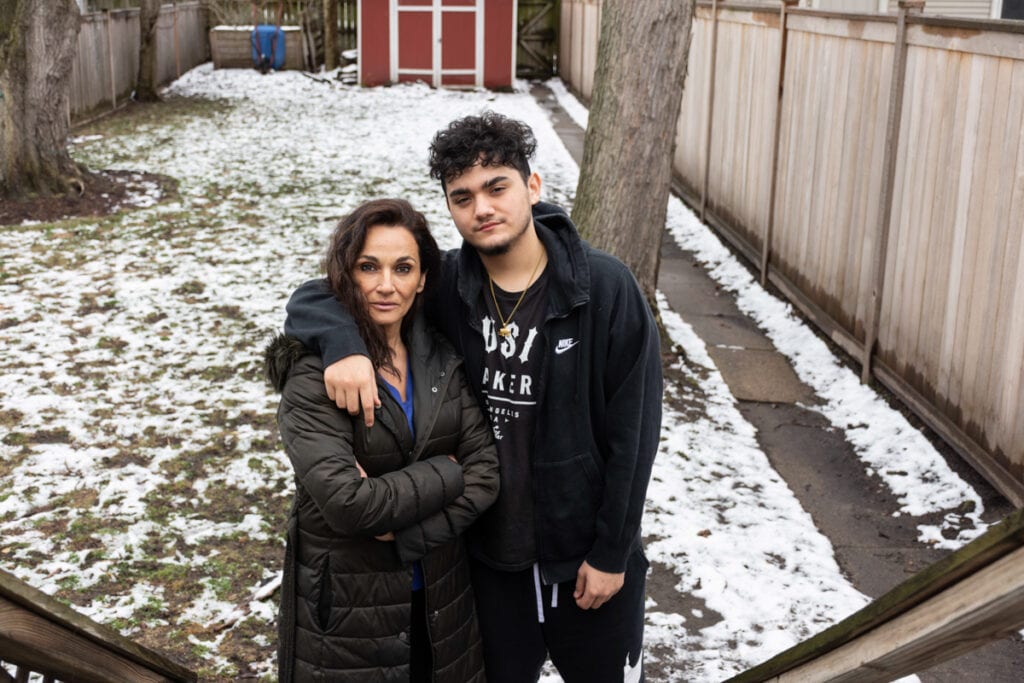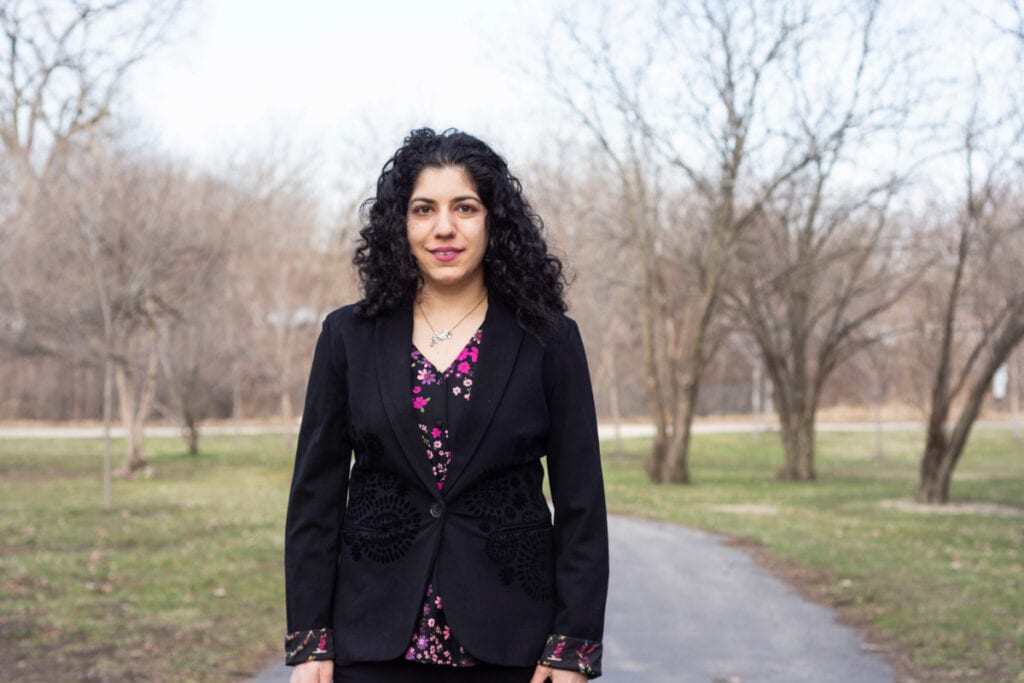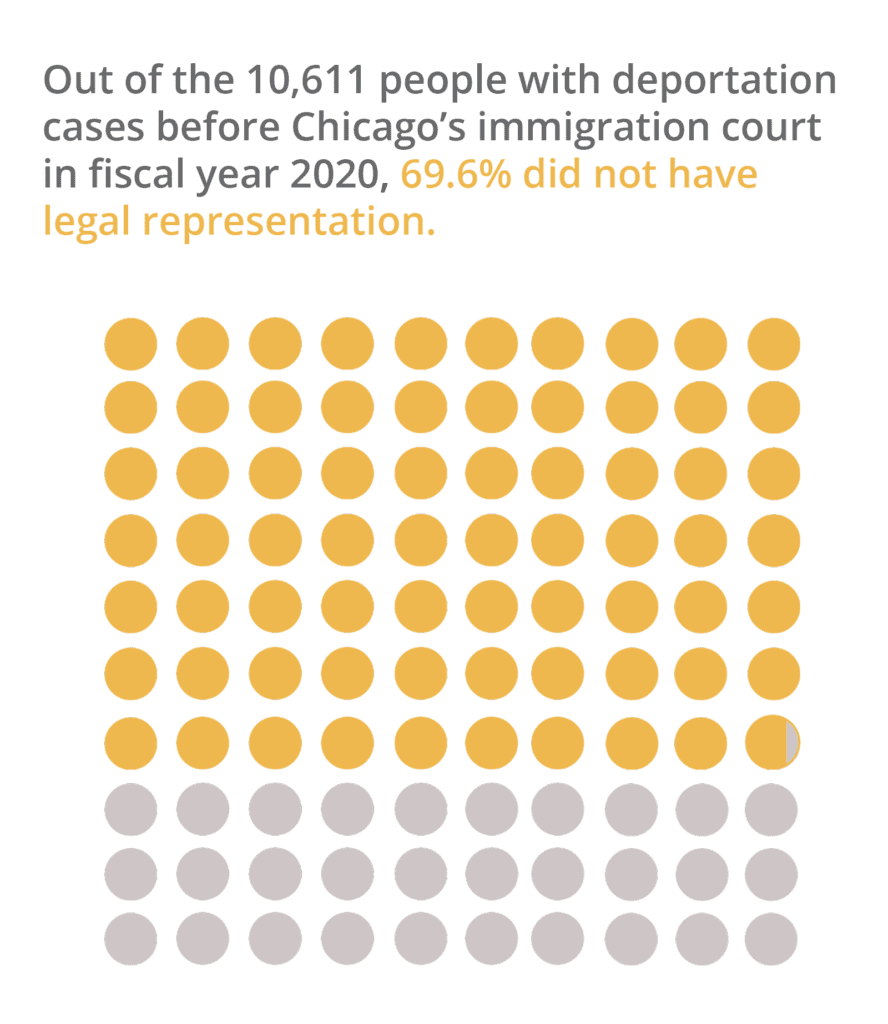 Foto de April Alonso para Borderless Magazine/Catchlight Local
Foto de April Alonso para Borderless Magazine/Catchlight LocalUna nueva unidad dentro de la oficina del defensor público del Condado de Cook quiere una mejor representación para los clientes no ciudadanos en riesgo de ser deportados.
Alejandra Cano pensaba que estaba a salvo.
Hacía cinco años que estaba sobria tras décadas de lucha contra la drogadicción. Acumuló varios delitos menores cuando consumía, sobre todo por robar en tiendas. Pero eso era otra vida. En ésta, Cano, de 46 años, era una madre soltera trabajadora que vivía en un cómodo apartamento en un primer piso en el West Side de Chicago con sus dos hijos adolescentes. Y después de casi 20 años sin ver a su padre ni a su tierra natal, Cano decidió volar a Chile en agosto de 2019.
"Todavía tenía mi tarjeta verde. No tenía motivos para preocuparme", afirma Cano.
Se equivocó. A su regreso de Chile, los agentes del Servicio de Aduanas y Protección de Fronteras de EE.UU. del aeropuerto internacional O'Hare se llevaron a Cano a un lado. Cuando le tomaron las huellas dactilares en el control de aduanas, aparecieron sus antecedentes penales, a pesar de que su última condena se remontaba a cinco años atrás.. Tras horas de espera junto a otros no ciudadanos, un agente le retiró la tarjeta verde. El gobierno pretende ahora revocar su situación legal y deportarla.
Cano es una de las miles de personas -inmigrantes indocumentados, titulares de visados y residentes legales permanentes- que pasan cada año por un proceso de deportación en Chicago, según datos de los tribunales federales de inmigración recogidos por el Transactional Records Access Clearinghouse de la Universidad de Syracuse. Muchos acaban allí a través del sistema de justicia penal. Las detenciones no sólo atraen la atención del Servicio de Inmigración y Control de Aduanas de Estados Unidos, sino que determinadas condenas penales también pueden desencadenar un caso de deportación. Eso incluye delitos que, para un ciudadano, podrían significar sólo una tasa judicial o una breve pena de cárcel. Pero los no ciudadanos pueden acabar siendo castigados aún más con la deportación, lo que se conoce como una "consecuencia colateral", similar a la pérdida del derecho de voto y otras sanciones civiles que se añaden a las condenas penales.

Alejandra Cano y su hijo de secundaria Nico Ortiz fuera de su casa el martes 16 de marzo en Evanston, Illinois. April Alonso para Borderless Magazine/CatchLight Local
La Oficina del Defensor Público del Condado de Cook estima que su personal representa a cientos de no ciudadanos en casos de delitos graves en un momento dado - todos los cuales podrían dar lugar a tales consecuencias colaterales. Una nueva unidad de inmigración dentro de la oficina del defensor público tiene como objetivo interrumpir este conducto de condena a deportación. Trabajando con defensores públicos, fiscales y grupos comunitarios, la unidad se asegurará de que los no ciudadanos sean advertidos cuando un acuerdo con la fiscalía pueda costarles su estatus y su hogar.
Aunque Illinois lleva mucho tiempo exigía a los abogados defensores que lo hicieranCano dijo que sus defensores públicos del Condado de Cook nunca lo hicieron - un descuido que es demasiado fácil bajo el sistema actual, según varios abogados de inmigración y defensa en el Condado de Cook que hablaron con Injustice Watch y Borderless Magazine.
Tres de los cinco delitos menores de los que Cano se declaró culpable entre 2005 y 2013 fueron por hurto en comercios, lo que la convierte en deportable en virtud de la ley federal de inmigración.
Si le hubieran advertido de esto, Cano dijo que se lo habría pensado dos veces antes de subir a un avión. "Como mínimo, habría contratado a un abogado de inmigración para que me ayudara a averiguar qué estaba pasando", dijo.
Aunque el alcance de la nueva unidad de inmigración se limita actualmente a asesorar a los defensores públicos, los funcionarios del condado dicen que, en última instancia, quieren proporcionar abogados de inmigración gratuitos a más inmigrantes que se enfrentan a la deportación en Chicago. Pero para cumplir esta promesa será necesario cambiar la ley estatal, así como superar las limitaciones fiscales que han obstaculizado la oficina del defensor público durante décadas.
Un delito de deportación
Las cuestiones de inmigración ocupan un lugar destacado en el sistema judicial del condado de Cook, donde uno de cada cinco residentes nació en otro país. La mayoría de ellos viven en la zona metropolitana de Chicago, donde residen 480.000 personas. titulares de la tarjeta verde y unos 460.000 inmigrantes indocumentados, según a reciente estudio publicado por The Chicago Council on Global Affairs.
No está claro cuántos no ciudadanos se enfrentan a cargos penales en el condado de Cook; el tribunal de circuito no realiza un seguimiento de la situación migratoria de los acusados. Una encuesta interna realizada el año pasado reveló que los defensores públicos del condado de Cook representaban colectivamente a unos 700 no ciudadanos de más de 80 países diferentes en causas abiertas por delitos graves.
"Todas esas personas se enfrentan a consecuencias de inmigración derivadas de ese caso criminal", dijo el nuevo Defensor Público del Condado de Cook, Sharone Mitchell Jr, que toma las riendas el 1 de abril.
La ley de inmigración es a la vez exacta e imprecisa en lo que respecta a los delitos que pueden dar lugar a la expulsión de un no ciudadano. Por lo general, las condenas susceptibles de deportación se dividen en dos categorías: delitos graves con agravantes... una lista de más de 30 tipos de delitosEntre los delitos que se le imputan figuran el tráfico de drogas, la presentación de declaraciones de la renta falsas y la incomparecencia ante los tribunales, así como los delitos "que impliquen vileza moral."
Esta última categoría es imprecisa a propósito; incluso el Departamento de Justicia ha dicho que el término es "difícil de definir con precisión." Se incluyen el asesinato y otros actos violentos, pero también los delitos no violentos, como la malversación, el fraude, la falsificación y el robo. A falta de una definición clara, los tribunales de inmigración toman decisiones sobre la base de una escala de criterios. caso por caso, informados por la jurisprudencia pertinente y los estatutos penales estatales.
Descargar un PDF compartible con consejos de un abogado de inmigración para los no ciudadanos en los tribunales penales.
Para complicar aún más las cosas, las penas alternativas, como la libertad condicional, la restitución, los servicios a la comunidad y la rehabilitación por consumo de drogas -opciones a las que se recurre habitualmente cuando se busca llegar a un acuerdo con los fiscales-. también puede poner a un no ciudadano en riesgo de deportación.
Por estas razones, anticipar las consecuencias colaterales de la inmigración puede resultar difícil, incluso para los abogados de defensa penal mejor informados. No obstante, en el 2010 Padilla contra Kentucky gobernanteel Tribunal Supremo de los EE.UU. sostuvo que, en virtud de la Sexta Enmienda, los abogados tienen la obligación de preguntar a sus clientes sobre su situación de ciudadanía e informarles de si un acuerdo de culpabilidad conlleva un riesgo de deportación.
Aunque el mandato de los tribunales es claro en teoría, varios abogados de inmigración de Chicago declararon a Injustice Watch y Borderless Magazine que, en la práctica, las lagunas del sistema suelen dejar a los clientes inmigrantes desprotegidos frente a las consecuencias colaterales.
Kate Ramos, abogada supervisora del Centro Nacional de Justicia para Inmigrantes, una organización sin ánimo de lucro con sede en Chicago, representa a Cano en su proceso de deportación. Según Ramos, Cano no es el único cliente que se ha visto inmerso en un proceso de deportación tras llegar a un acuerdo con la fiscalía: "Muchos de nuestros clientes vienen y me dicen... que no eran conscientes de las consecuencias".
Según Ramos, contar con una unidad especializada en inmigración en la oficina del abogado de oficio podría ser importante. "Los defensores públicos no son abogados de inmigración", dijo. "Ellos buscan [el] bien para sus clientes desde el punto de vista penal, [y] por eso es importante tener una oficina que realmente pueda centrarse en ambos".
Antes de que la unidad de inmigración se pusiera en marcha, los abogados de oficio consultaban caso por caso con los abogados de inmigración.
Sin embargo, Angela Kilpatrick, defensora de oficio del juzgado de Bridgeview, en el condado de Cook, afirma que a veces es difícil conciliar el alivio más inmediato para un cliente -por ejemplo, aceptar un acuerdo con la fiscalía para librarse de la custodia- con las posibles consecuencias para su situación migratoria en el futuro.
Contar con un abogado interno especializado en inmigración que asesore a los abogados de oficio sobre estas cuestiones contribuirá en gran medida a crear un "enfoque integral de la defensa [penal]", afirmó.

Hena Mansori, abogada jefe de la nueva unidad de inmigración de la Oficina del Defensor Público del Condado de Cook, cerca de su casa el 22 de marzo, en el Northwest Side de Chicago. April Alonso para Borderless Magazine/CatchLight Local
Al frente de la unidad está la veterana abogada de inmigración Hena Mansori, que trabajó en el Centro Nacional de Justicia para Inmigrantes durante más de una década. Desde enero, se ha ocupado de la formación de decenas de defensores públicos del condado de Cook a través de Zoom y el desarrollo de un nuevo sistema de admisión para identificar y rastrear los casos en que los defensores públicos están representando a los no ciudadanos. El sistema estará protegido por los privilegios abogado-cliente, por lo que los clientes no tendrán que preocuparse de ser objeto de ICE.
La unidad de inmigración sigue siendo un equipo de una persona, pero el condado tiene previsto contratar a otros dos abogados especializados en inmigración y a un gestor de casos que se unirán a Mansori a finales de este año, dijo.
Mansori también espera poner los conocimientos directamente en manos de las comunidades de inmigrantes mediante sesiones informativas con socios comunitarios. En noviembre, en una formación virtual con la United African Organization, con sede en Chicago, Mansori explicó cómo una condena penal puede conducir a la deportación, y respondió a las preguntas de unos 40 asistentes.
Seguir leyendo
"[La unidad de inmigración] es fundamental para nuestra comunidad", afirmó Fasika Alem, Directora de Programas de la Organización Africana Unida. "Como el resto de la población negra, la interacción de los inmigrantes africanos con las fuerzas de seguridad es mayor porque vivimos en comunidades con exceso de vigilancia policial".
Aunque los inmigrantes negros representan alrededor del 7% del total de no ciudadanos residentes en Estados Unidos, constituyeron más del 20% de los inmigrantes que se enfrentaron a la deportación por motivos penales entre 2003 y 2015, según un análisis de datos federales sobre inmigración por la Clínica de Derechos de los Inmigrantes de la Facultad de Derecho de la Universidad de Nueva York.
El grupo de Alem forma parte de la coalición de activistas y grupos de derechos civiles que impulsaron la creación de la unidad de inmigración. Aunque aplaude su puesta en marcha, afirma que las autoridades no deberían perder de vista lo que, en su opinión, es el objetivo principal: la representación universal de todos los inmigrantes que necesiten un abogado en Chicago.
"Vamos a seguir presionando para conseguirlo. Cuanto antes, mejor", afirmó.
Un abogado para cada inmigrante
Aunque la Sexta Enmienda garantiza a los acusados de delitos penales el derecho a un abogado, ese mismo derecho no se extiende a los tribunales de inmigración. El año fiscal pasado, 66% de los inmigrantes en proceso de deportación en todo el país no tenían abogado, según el Transactional Records Access Clearinghouse de la Universidad de Syracuse. En el Tribunal de Inmigración de Chicago, esa cifra se aproximaba a 70%.
Cuando los inmigrantes que se enfrentan a la deportación cuentan con un abogado, están a la altura de 10 veces más probable para ganar sus casos, según un análisis del Instituto Vera de Justicia. Varias localidades ya ofrecen al menos algún tipo de defensa de inmigrantes financiada con fondos públicos. Nueva York garantiza representación universal en los tribunales de inmigración de todo el estado.

Datos proporcionados por TRACMichelle Kanaar/Revista sin fronteras
Es poco probable que Illinois siga el ejemplo pronto. La oficina del defensor público del condado de Cook está impulsando una enmienda a una ley de Illinois que ampliaría a quién pueden representar los defensores públicos para incluir a los no ciudadanos con casos ante el tribunal de inmigración de Chicago. La enmienda fue aprobada por un comité de la Cámara de Representantes de Illinois en marzo.
Incluso si la medida tiene éxito, la falta de financiación y de personal significa que el condado seguiría eligiendo qué no ciudadanos reciben un abogado. Por el momento, la prioridad será proporcionar abogados de inmigración a los acusados que están actualmente representados por un defensor público del Condado de Cook o lo han estado en el pasado, de acuerdo con Era Laudermilk, un diputado de asuntos legislativos en la oficina del defensor público del Condado de Cook.
"Nuestro objetivo [...] es asegurarnos de que prestamos el máximo de servicios posible y de que equilibramos las necesidades de las funciones centrales de la oficina sin robar a Pedro para pagar a Pablo", declaró Mitchell, director general de la Oficina del Alto Comisionado de las Naciones Unidas para los Refugiados (ACNUR). defensor público entrante del condado de Cook.
Eso apunta a una preocupación mayor para Xanat Sobrevilla, una organizadora de Comunidades Organizadas Contra las Deportaciones, un grupo de derechos de los inmigrantes en Chicago. A ella le preocupa que el Condado de Cook no financie adecuadamente la unidad de inmigración o la oficina del defensor público en general para hacer correctamente su trabajo, como aplastantes cargas de trabajo tienen defensores públicos sobrecargados durante años.
"Si no podemos poner fin al exceso de vigilancia policial de las comunidades [negras y marrones], no evitaremos que más inmigrantes entren en contacto con el sistema de justicia penal", dijo Sobrevilla.
Mansori espera que, con el tiempo, el condado invierta en representación universal, sobre todo teniendo en cuenta el impacto financiero y emocional que la detención durante los procedimientos de deportación tiene en los miembros de la familia. Pero por ahora, defender casos en los que la ley de inmigración es turbia podría tener un impacto más amplio a la hora de frenar las consecuencias colaterales. Cuando los tribunales de inmigración deben interpretar, por ejemplo, qué tipos de delitos implican "vileza moral", ganar la exención de deportación en un caso puede "sentar un precedente que beneficie también a muchos otros", dijo Mansori.
Por su parte, Cano tiene la esperanza de que una defensa de inmigración más sólida en el condado de Cook significará que otros no tendrán que pasar por lo que ella pasó. El caso de Cano sigue en el limbo, ya que su audiencia ante un juez de inmigración fue cancelada debido a la pandemia de Covid-19 y aún no ha sido reprogramada.
Hasta que sepa si puede quedarse, Cano se lo toma día a día.
"Eso es algo que aprendí en la recuperación", dijo.
Rita Oceguera ha contribuido con información. Esta historia forma parte del serie consecuencias colateralesuna asociación entre Vigilancia de la injusticia y Borderless Magazine para explorar la cadena que va de la condena penal a la deportación en el condado de Cook.

